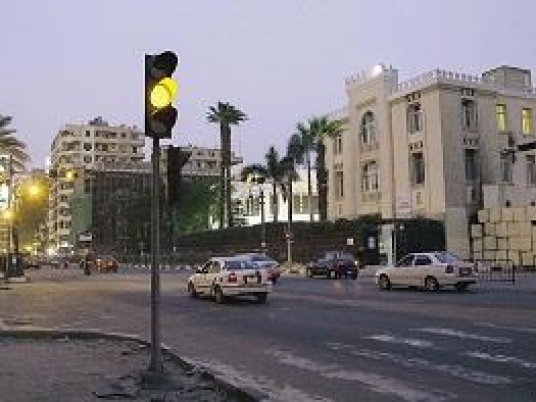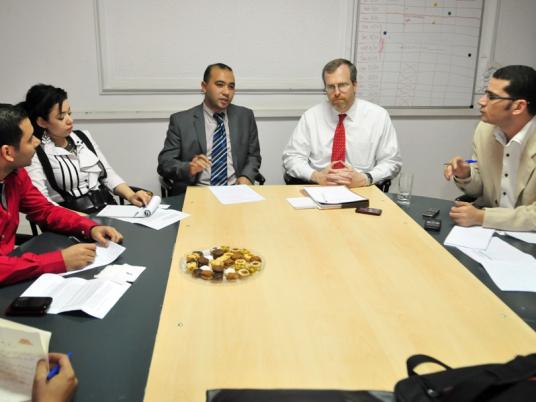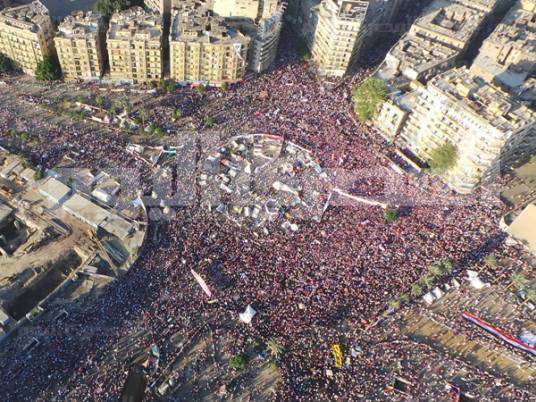A clash between two worlds. One world aspires to break the chains of humiliation that have long robbed it of its humanity and stifled its creative energy. Its eclectic representatives–rich and poor, educated and illiterate, Westernized and Islamized, young and old–have taken to the streets with the goal of bringing down an authoritarian regime characterized by a stunning degree of corruption and conceptual myopia. The Egyptian regime reflects an aspect of the country that is rotting, sclerotic and brutal. Its detachment from reality has become ever more stark in the past days. And there is yet a third world, the Egyptian military, whose position has been conspicuously ambiguous throughout the crisis.
On the afternoon of 28 January, in a decisive battle that lasted hours, the battlefront shifted back and forth. For hours it went over the Kasr al-Nil bridge leading to central Cairo. It mimicked the movement of a pendulum pacing time. Then, shortly before sunset, the riot police sent by the regime withdrew, its lines collapsing. Egypt’s clock struck the beginning of the end of an epoch.
There was relative calm following the appearance of the military. But the regime had utterly failed to apprehend the moment. Well past midnight, its leader appeared on television and delivered a speech that managed to combine banality and arrogance. As revolution raged, he offered platitudes to the people. It was hard to know whether to laugh or to cry.
More promises followed, provocative in their vagueness. Meanwhile, parts of Cairo erupted as law and order collapsed. Central Cairo’s Belle Epoque buildings had witnessed such scenes before–indeed, 58 years ago almost to the day. On 26 January 1952 central Cairo burned, signaling the end of old "liberal" Egypt and the eventual advent of the authoritarian regime that has controlled the country since then. Some of the sparks of the upheaval at the time were similar to those that have ignited the current unrest: social injustice, difficulty in achieving upward mobility and deep cultural divisions.
This uprising must not lead to an even more repressive regime. Fortunately, there are auspicious signs. Although, as in 1952, much of the looting and destruction has been instigated by elements within the ruling regime, the damage this time has thus far been much more limited. And the movement has been surprisingly disciplined, uncharacteristic of a normally chaotic society.
In the days following the withdrawal of the riot police and their replacement by the relatively neutral military, hundreds of thousands of demonstrators gathered in Tahrir Square to express their anger. They resented the regime's stubborn refusal to deal seriously with their demands and with the new reality. But the anger was mellowed by an almost festive atmosphere, exuberant and alive, filled with the sounds of chants, drums and creative forms of expression not usually common in the Arab world. A man carrying a small black and white spotted cat had a sign in English saying "Mubarak Go", with Arabic on the other side. Foreign residents, students (and the few tourists left) were welcomed as part of the crowd. At dusk on Monday, the scene seemed unthreatening enough for a senior European couple to sit biding their time on a park bench at the edge of the square.
On Tuesday the numbers grew, reportedly reaching a million in central Cairo alone. Yet the level of organization was remarkable–from security checks for weapons undertaken by designated demonstrators, to the provision of food and blankets.
Then Egypt’s regime struck again. The attack started with a seemingly conciliatory declaration by its leader. It embodied substantial and serious promises mired in the language of conceit–and, in the final analysis, deceit. The next day this world’s thuggish face was unveiled for all to see. Orchestrated violence flared in what I believe will be seen as a final, desperate act.
Egypt will never be the same again. The question of course is what comes next. But the spirit of Egypt's revolution must survive. Its dissolution at this point is likely to result in far bloodier confrontations in future, led by hard core, irredentist elements. And it is crucial that the new Egypt not be "nationalized" by remaining elements of the regime, or hijacked by the military or by groups rejecting the values of diversity and pluralism. All sectors of society have been part of this revolution, and they must be represented in any new order.
Translated from the Arabic Edition.




